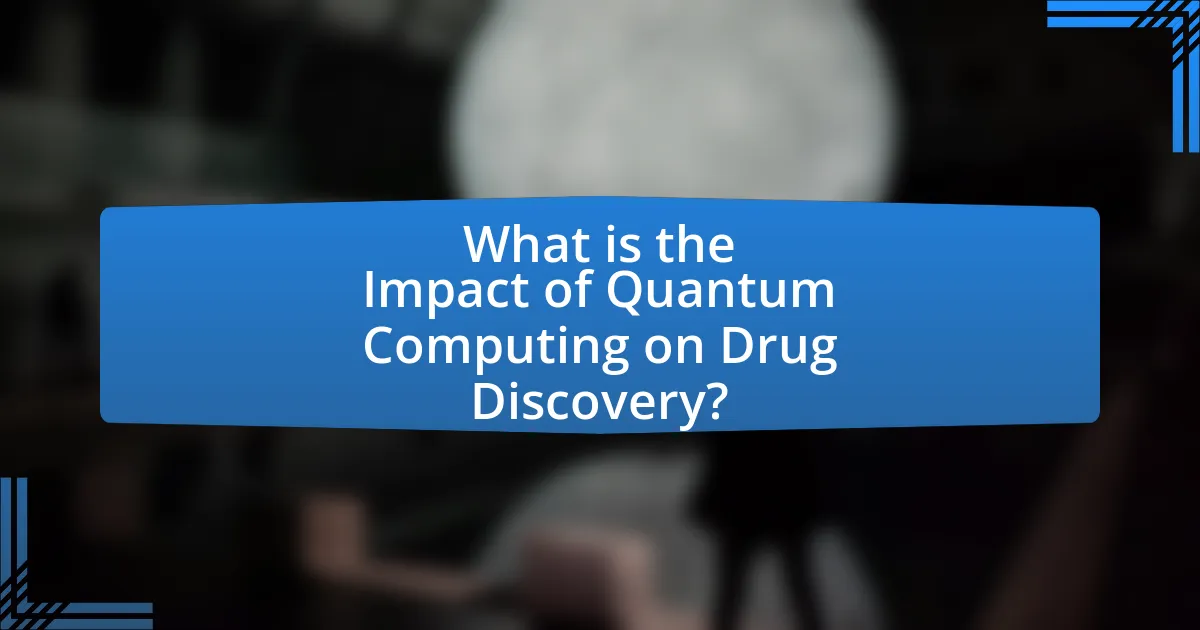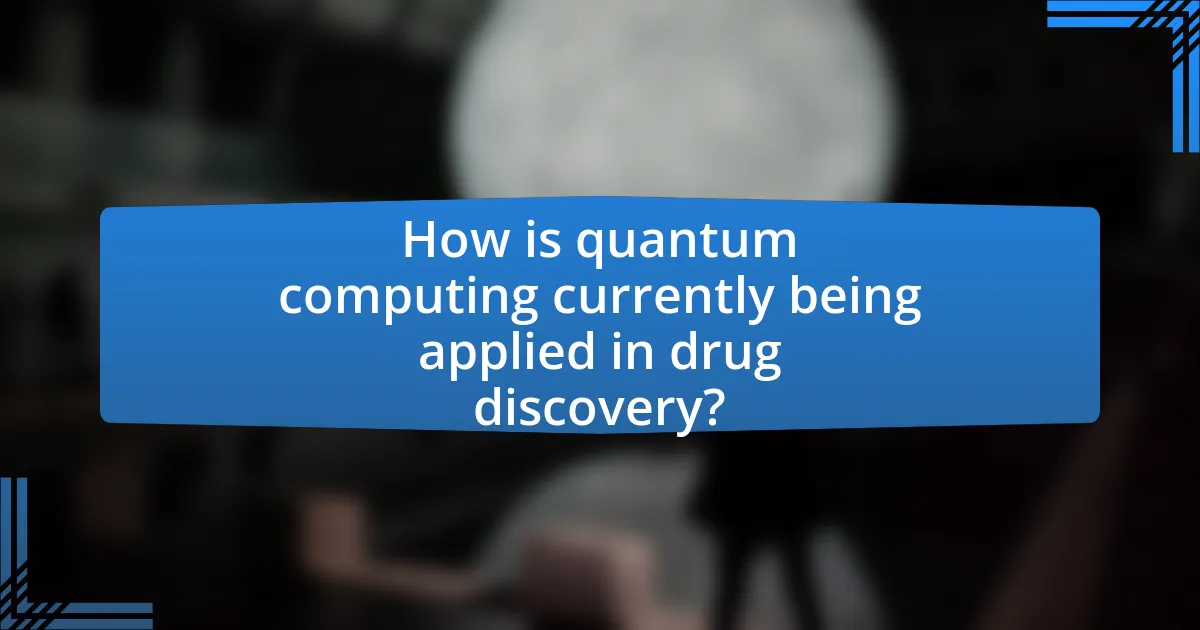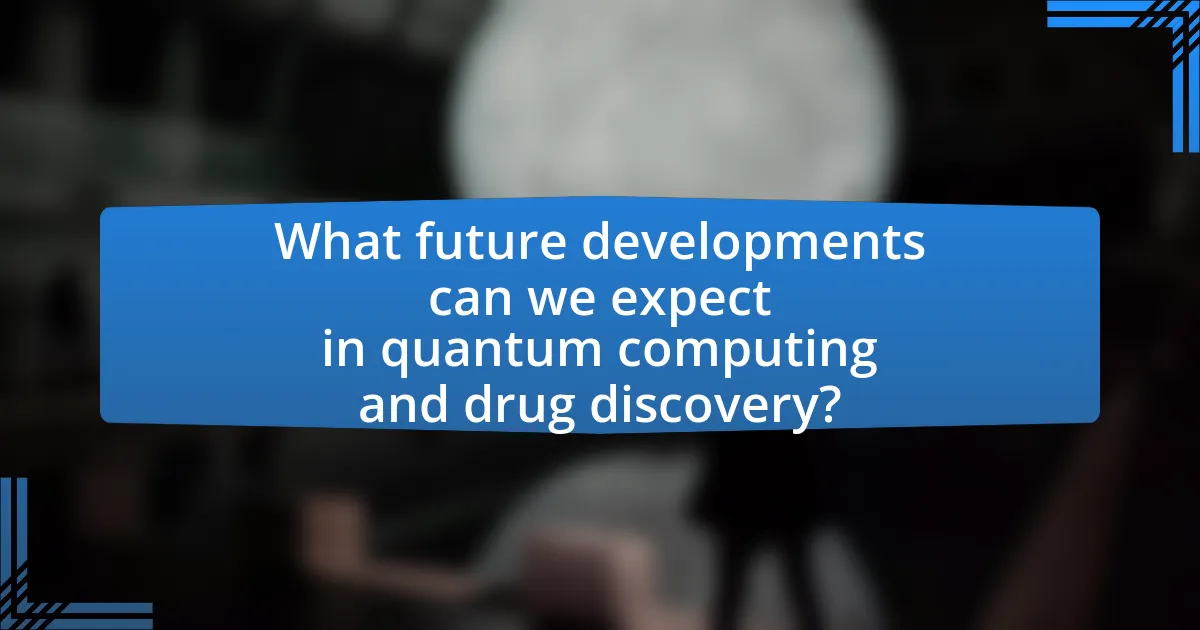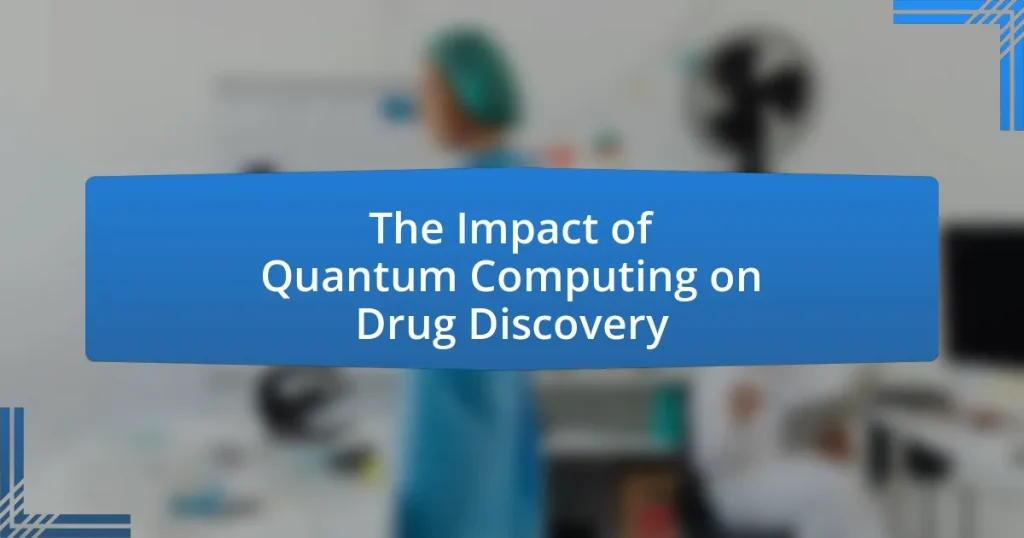Quantum computing is revolutionizing drug discovery by enabling the simulation of molecular interactions with unprecedented speed and accuracy. This technology addresses the limitations of traditional computing methods, which often struggle with the complexity of quantum systems, leading to inefficiencies in identifying viable drug candidates. Key principles such as superposition and entanglement allow quantum computers to process complex molecular data simultaneously, significantly enhancing the drug development process. Current applications include collaborations between pharmaceutical companies and quantum computing firms, demonstrating the potential for faster and more effective drug discovery methodologies. The article explores the impact of quantum computing on drug discovery, highlighting its benefits, challenges, and future developments in the field.

What is the Impact of Quantum Computing on Drug Discovery?
Quantum computing significantly accelerates drug discovery by enabling the simulation of molecular interactions at an unprecedented scale and accuracy. Traditional computing methods struggle with the complexity of quantum systems, often requiring approximations that can lead to less accurate results. In contrast, quantum computers can model the behavior of molecules and their interactions more precisely, which can lead to the identification of potential drug candidates faster and with greater efficacy. For instance, research from IBM and the University of Toronto demonstrated that quantum algorithms could optimize molecular structures, potentially reducing the time and cost associated with drug development. This capability not only enhances the efficiency of discovering new drugs but also allows for the exploration of previously infeasible chemical spaces, thereby expanding the possibilities for innovative treatments.
How does quantum computing differ from classical computing in drug discovery?
Quantum computing differs from classical computing in drug discovery primarily through its ability to process complex molecular interactions simultaneously, leveraging quantum superposition and entanglement. Classical computing relies on binary bits and sequential processing, which limits its efficiency in simulating molecular systems, especially for large and complex compounds. In contrast, quantum computers can represent and analyze multiple states at once, significantly accelerating the discovery process. For instance, research indicates that quantum algorithms can solve certain problems, such as protein folding and molecular modeling, exponentially faster than classical algorithms, potentially reducing the time and cost associated with drug development.
What are the fundamental principles of quantum computing relevant to drug discovery?
The fundamental principles of quantum computing relevant to drug discovery include superposition, entanglement, and quantum interference. Superposition allows quantum bits (qubits) to exist in multiple states simultaneously, enabling the exploration of numerous molecular configurations at once, which accelerates the identification of potential drug candidates. Entanglement facilitates the correlation of qubits, allowing for complex calculations that can model interactions between molecules more accurately than classical computing methods. Quantum interference enhances the probability of finding optimal solutions by amplifying desirable outcomes while canceling out less favorable ones. These principles collectively enable quantum computers to perform simulations and optimizations that are infeasible for classical computers, significantly advancing the drug discovery process.
How does quantum computing enhance computational power for drug discovery?
Quantum computing enhances computational power for drug discovery by enabling the simulation of complex molecular interactions at unprecedented speeds and accuracy. Traditional computing struggles with the exponential complexity of quantum systems, while quantum computers utilize qubits to represent and process vast amounts of data simultaneously. This capability allows researchers to model drug interactions and predict molecular behavior more effectively, significantly reducing the time required for drug development. For instance, a study by Google and collaborators demonstrated that quantum algorithms could outperform classical methods in simulating molecular structures, showcasing the potential for faster identification of viable drug candidates.
What challenges does drug discovery face that quantum computing can address?
Quantum computing can address several challenges in drug discovery, particularly in the areas of molecular modeling, optimization of drug candidates, and simulation of complex biological systems. Traditional computational methods struggle with the exponential complexity of quantum systems, making it difficult to accurately predict molecular interactions and behaviors. Quantum computers can perform calculations on quantum states, allowing for precise simulations of molecular structures and interactions, which can significantly accelerate the identification of viable drug candidates. For instance, a study published in Nature by Google researchers demonstrated that quantum algorithms could outperform classical methods in simulating molecular systems, highlighting the potential for quantum computing to revolutionize drug discovery processes.
How does the complexity of molecular interactions impact drug discovery?
The complexity of molecular interactions significantly impacts drug discovery by influencing the accuracy of target identification and the prediction of drug efficacy. Complex interactions among proteins, nucleic acids, and small molecules can lead to unpredictable biological responses, making it challenging to design effective drugs. For instance, the binding affinity between a drug and its target can be affected by numerous factors, including conformational changes and the presence of competing molecules. Research indicates that over 90% of drug candidates fail during clinical trials, often due to unforeseen interactions at the molecular level. This complexity necessitates advanced computational methods, such as quantum computing, to model and simulate molecular behavior more accurately, thereby improving the drug discovery process.
What are the limitations of traditional methods in drug discovery?
Traditional methods in drug discovery are limited by their reliance on time-consuming and costly processes, often resulting in a high failure rate. These methods typically involve trial-and-error approaches, which can take years to yield results, and they frequently overlook complex biological interactions. For instance, the average cost to bring a new drug to market exceeds $2.6 billion, with a success rate of only about 10% for drugs that enter clinical trials. Additionally, traditional methods struggle to accurately model the intricate dynamics of molecular interactions, leading to suboptimal drug candidates. This inefficiency highlights the need for innovative approaches, such as quantum computing, which can potentially enhance the speed and accuracy of drug discovery processes.
What potential benefits does quantum computing bring to drug discovery?
Quantum computing offers significant benefits to drug discovery by enabling the simulation of molecular interactions at an unprecedented scale and accuracy. This capability allows researchers to predict the behavior of complex biological systems and identify potential drug candidates more efficiently. For instance, quantum algorithms can process vast datasets and optimize molecular structures, which accelerates the identification of effective compounds. Studies indicate that quantum computing could reduce the time required for drug development by up to 30%, as it enhances the precision of simulations and reduces the need for extensive experimental trials.
How can quantum computing accelerate the drug discovery process?
Quantum computing can accelerate the drug discovery process by enabling the simulation of molecular interactions at unprecedented speeds and accuracy. Traditional computing methods struggle with the complex calculations required to model the behavior of molecules, particularly in large-scale systems. Quantum computers utilize quantum bits, or qubits, which can represent multiple states simultaneously, allowing for the exploration of numerous molecular configurations and interactions in parallel.
For instance, a study by researchers at IBM demonstrated that quantum algorithms could significantly reduce the time needed to simulate chemical reactions, potentially decreasing the drug development timeline from years to months. Additionally, quantum computing can enhance the identification of promising drug candidates by optimizing molecular structures and predicting their efficacy and safety profiles more accurately than classical methods. This capability is supported by the exponential growth in computational power that quantum systems offer, which is crucial for tackling the intricate challenges of drug discovery.
What improvements in accuracy can quantum computing provide in drug design?
Quantum computing can significantly enhance accuracy in drug design by enabling precise simulations of molecular interactions at a quantum level. This capability allows researchers to model complex biological systems and predict the behavior of drug candidates with greater fidelity than classical computing methods. For instance, quantum algorithms can efficiently solve the Schrödinger equation, which describes how quantum states evolve, leading to more accurate predictions of molecular properties and interactions. Studies have shown that quantum computing can reduce the time and resources needed for drug discovery, potentially increasing the success rate of identifying viable drug candidates.

How is quantum computing currently being applied in drug discovery?
Quantum computing is currently being applied in drug discovery by enabling the simulation of molecular interactions at an unprecedented scale and accuracy. This capability allows researchers to predict the behavior of complex biological systems and identify potential drug candidates more efficiently. For instance, companies like D-Wave and IBM are utilizing quantum algorithms to optimize molecular structures and accelerate the drug design process, significantly reducing the time and cost associated with traditional methods. Studies have shown that quantum computing can outperform classical computing in specific tasks, such as simulating quantum systems, which is crucial for understanding drug interactions at the atomic level.
What are some real-world examples of quantum computing in drug discovery?
Real-world examples of quantum computing in drug discovery include collaborations between pharmaceutical companies and quantum computing firms, such as the partnership between D-Wave Systems and Biogen, which focuses on optimizing drug design processes. Another example is IBM’s Quantum for Drug Discovery initiative, where researchers utilize IBM’s quantum computers to simulate molecular interactions, significantly speeding up the identification of potential drug candidates. Additionally, Rigetti Computing has worked with pharmaceutical companies to apply quantum algorithms for protein folding simulations, which are crucial in understanding diseases and developing targeted therapies. These examples demonstrate the practical application of quantum computing in enhancing drug discovery efficiency and accuracy.
Which pharmaceutical companies are leading the way in quantum computing applications?
Bristol Myers Squibb, Roche, and Novartis are leading pharmaceutical companies in quantum computing applications. Bristol Myers Squibb has partnered with IBM to explore quantum computing for drug discovery, focusing on complex molecular simulations. Roche collaborates with D-Wave Systems to enhance drug development processes through quantum algorithms. Novartis is working with Google Quantum AI to leverage quantum computing for optimizing drug design and discovery workflows. These collaborations demonstrate a commitment to integrating quantum technologies to accelerate advancements in pharmaceuticals.
What specific drug discovery projects are utilizing quantum computing technologies?
Specific drug discovery projects utilizing quantum computing technologies include the collaboration between IBM and Pfizer, which focuses on using quantum algorithms to optimize drug design and molecular simulations. Additionally, D-Wave Systems is working with Biogen to explore quantum annealing for protein folding and drug interactions. Another notable project is the partnership between Google and the University of California, which aims to leverage quantum computing for simulating complex biological systems and accelerating drug discovery processes. These projects demonstrate the potential of quantum computing to enhance the efficiency and effectiveness of drug development.
How are researchers collaborating with quantum computing experts?
Researchers are collaborating with quantum computing experts by forming interdisciplinary teams that leverage quantum algorithms to enhance drug discovery processes. These collaborations often involve academic institutions partnering with technology companies specializing in quantum computing, such as IBM and Google, to develop and test quantum simulations that can model complex molecular interactions more efficiently than classical computing methods. For instance, a study published in the journal “Nature” demonstrated how quantum computing could potentially reduce the time required for drug discovery by simulating molecular structures and reactions at unprecedented speeds, showcasing the tangible benefits of such collaborations.
What interdisciplinary approaches are being taken in quantum drug discovery?
Interdisciplinary approaches in quantum drug discovery involve the integration of quantum computing, chemistry, biology, and data science. Quantum computing enhances molecular simulations, allowing for more accurate modeling of drug interactions at the quantum level, which traditional computing struggles to achieve. For instance, researchers at IBM have demonstrated that quantum algorithms can predict molecular properties more efficiently than classical methods, significantly speeding up the drug discovery process. Additionally, collaborations between chemists and computer scientists are essential for developing algorithms that leverage quantum mechanics to optimize drug candidates, as seen in projects like the Quantum Drug Discovery Initiative by Google. These combined efforts are paving the way for breakthroughs in personalized medicine and targeted therapies.
How do partnerships between tech companies and pharmaceutical firms enhance drug discovery?
Partnerships between tech companies and pharmaceutical firms enhance drug discovery by leveraging advanced technologies such as artificial intelligence and quantum computing to accelerate the research and development process. These collaborations enable pharmaceutical companies to utilize tech firms’ computational power and data analytics capabilities, which can significantly reduce the time required for drug discovery. For instance, a study by the Massachusetts Institute of Technology highlighted that AI algorithms can analyze vast datasets to identify potential drug candidates more efficiently than traditional methods, leading to faster clinical trials and reduced costs. Additionally, quantum computing offers the potential to simulate molecular interactions at unprecedented speeds, further streamlining the drug development pipeline.

What future developments can we expect in quantum computing and drug discovery?
Future developments in quantum computing are expected to significantly enhance drug discovery processes by enabling the simulation of complex molecular interactions with unprecedented accuracy. Quantum computers can process vast amounts of data and perform calculations that are infeasible for classical computers, allowing researchers to model drug interactions at the quantum level. For instance, companies like D-Wave and IBM are already working on quantum algorithms specifically designed for optimizing molecular structures and predicting their behavior, which can lead to faster identification of potential drug candidates. Additionally, advancements in quantum machine learning techniques are anticipated to improve the efficiency of data analysis in drug discovery, potentially reducing the time and cost associated with bringing new drugs to market.
What advancements in quantum technology could further impact drug discovery?
Advancements in quantum technology, particularly in quantum computing and quantum simulations, could significantly enhance drug discovery by enabling the modeling of complex molecular interactions with unprecedented accuracy. Quantum computers can process vast amounts of data and perform calculations that are infeasible for classical computers, allowing researchers to simulate the behavior of drug molecules at the quantum level. For instance, a study published in “Nature” by Google AI Quantum and collaborators demonstrated that quantum algorithms could accurately simulate molecular structures, which is crucial for understanding drug interactions. This capability can lead to faster identification of potential drug candidates and more efficient optimization of their properties, ultimately accelerating the drug development process.
How might improvements in quantum algorithms change drug discovery methodologies?
Improvements in quantum algorithms could significantly enhance drug discovery methodologies by enabling faster and more accurate simulations of molecular interactions. Quantum algorithms, such as the Variational Quantum Eigensolver, can process complex quantum states that classical algorithms struggle to handle, allowing researchers to predict the behavior of drug molecules and their interactions with biological targets more efficiently. This capability can lead to a reduction in the time and cost associated with drug development, as evidenced by studies showing that quantum computing can potentially solve optimization problems in drug design exponentially faster than classical methods. For instance, a 2020 study published in Nature demonstrated that quantum algorithms could outperform classical counterparts in simulating molecular systems, highlighting their potential to revolutionize the field of drug discovery.
What role will artificial intelligence play alongside quantum computing in drug discovery?
Artificial intelligence will enhance quantum computing’s capabilities in drug discovery by optimizing molecular simulations and predicting drug interactions more efficiently. Quantum computing can process complex molecular data at unprecedented speeds, while AI algorithms can analyze this data to identify potential drug candidates and optimize their structures. For instance, a study published in Nature Reviews Drug Discovery highlights that combining AI with quantum algorithms can significantly reduce the time required for drug development, potentially decreasing it from years to months. This synergy allows researchers to explore vast chemical spaces and improve the accuracy of predictions, ultimately accelerating the discovery of new therapeutics.
What are the ethical considerations surrounding quantum computing in drug discovery?
The ethical considerations surrounding quantum computing in drug discovery include issues of data privacy, equitable access to technology, and the potential for unintended consequences in drug development. Data privacy is critical as quantum computing can process vast amounts of sensitive health information, raising concerns about how this data is stored and used. Equitable access is essential to ensure that advancements in drug discovery benefit all populations, not just those with resources to invest in quantum technologies. Additionally, the complexity of quantum algorithms may lead to unforeseen side effects in drug interactions, necessitating rigorous ethical oversight to prevent harm. These considerations highlight the need for a framework that balances innovation with ethical responsibility in the application of quantum computing in healthcare.
How can we ensure equitable access to quantum computing advancements in pharmaceuticals?
To ensure equitable access to quantum computing advancements in pharmaceuticals, it is essential to establish collaborative frameworks that involve public-private partnerships, government funding, and open-source initiatives. These frameworks can facilitate shared resources, knowledge, and technology among diverse stakeholders, including academic institutions, small biotech firms, and underrepresented communities. For instance, initiatives like the Quantum Computing for Drug Discovery program by IBM aim to democratize access to quantum resources, allowing researchers from various backgrounds to leverage quantum algorithms for drug discovery. Such collaborative efforts can help bridge the gap between large pharmaceutical companies and smaller entities, ensuring that advancements benefit a wider population and promote inclusivity in the field.
What are the potential risks associated with quantum computing in drug development?
The potential risks associated with quantum computing in drug development include data security vulnerabilities, algorithmic inaccuracies, and the potential for increased complexity in computational models. Data security vulnerabilities arise because quantum computers can potentially break current encryption methods, exposing sensitive pharmaceutical data. Algorithmic inaccuracies may occur due to the nascent state of quantum algorithms, which could lead to incorrect predictions in drug interactions or efficacy. Additionally, the increased complexity of quantum computational models can result in challenges in interpretation and validation, complicating the drug development process. These risks highlight the need for robust frameworks to ensure the safe and effective integration of quantum computing in pharmaceutical research.
What practical steps can researchers take to integrate quantum computing into their drug discovery processes?
Researchers can integrate quantum computing into their drug discovery processes by adopting quantum algorithms for molecular simulations and optimization tasks. These algorithms, such as the Variational Quantum Eigensolver (VQE) and Quantum Approximate Optimization Algorithm (QAOA), can significantly enhance the accuracy and efficiency of predicting molecular interactions and properties. For instance, a study published in Nature by Peruzzo et al. (2014) demonstrated that VQE could be used to compute ground state energies of molecules, showcasing the potential for quantum computing to outperform classical methods in specific scenarios. Additionally, researchers should collaborate with quantum computing platforms like IBM Quantum or Google Quantum AI to access necessary hardware and software tools, facilitating practical experimentation and development. Engaging in interdisciplinary partnerships with quantum physicists and computational chemists can also accelerate the integration process, ensuring that researchers leverage the full potential of quantum technologies in drug discovery.


